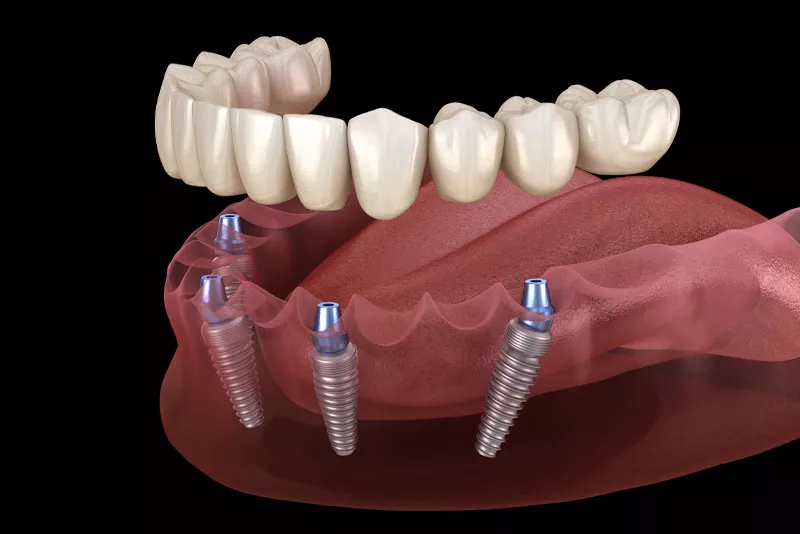Dental implants are marginally more susceptible to medical problems than natural teeth.
They therefore require slightly different methods of cleaning and maintenance from the rest of your teeth.
How well you look after your dental implant(s) greatly affects how long your implanted teeth will last.
Proper maintenance will therefore save you time, money, and prevent discomfort in the long run.
Someone who has had a dental implant must pay closer attention to flossing and brushing below the gum line in order to protect the bone structure that secures the implanted tooth in the mouth. Furthermore, diligent and proper brushing protects the relatively vulnerable tooth crown itself from chips and cracks. Lifestyle factors that increase your likelihood of developing likelihood or chipping and cracking teeth should also be avoided if you want your implants to last as long as possible.
Now we have the basics, let’s look at all these methods for looking after your implanted teeth in more detail:
Why do dental implants come out?
To fully understand how to best care for dental implants, it is important to know why dental implants can fail, break, or fall out in the first place.
A well designed and placed dental implant should only come out for two reasons: either the implant root becomes dislodged from the jaw or the tooth crown itself breaks.
It is important to note the fundamental difference between these two types of implant damage: namely that the former is due to damage to the gums and bone that surround the implant, whereas the latter is due to a weakness in the artificial tooth itself.
Although there are other causes of implant problems, such as allergies to the implant material, these are very rare indeed.
With this in mind, let’s go through how to prevent these two main causes of (implanted) tooth loss.
Stop your implant from coming loose by preventing gum disease
If an implanted tooth root comes out, it is almost always due to gum disease (periodontitis) in the gums that surround the implant.
 Gum disease damages the roots of teeth causing tooth loss
Gum disease damages the roots of teeth causing tooth loss
The only exceptions to these are if the implant is not placed properly or if your body rejects the implant as a foreign object—in these instances the implant usually comes loose in the first days or couple of weeks after the implant is placed.
Back to gum disease:
Gum disease is caused by bacteria in the mouth that accumulate at the gum line (the point where your gum wraps around your teeth).
These bacteria excrete acids that cause your gums to recede and expose the roots of your teeth along with the bone that holds these roots in place.
Over a long period of time, this acid can wear down the bone that supports your teeth.
This is the most common cause of tooth loss.
Given that the root of a dental implant is held in place by your jawbone, the degeneration of such bone through gum disease can cause your implanted root to become less firmly embedded in the jaw (Peri-Implantitis).
 Implanted Root with Crown
Implanted Root with Crown
This process can, over time, cause your implant to come loose and fall out.
Gum disease is incredibly common; most people experience it at least once in their lives.
It can cause you to lose your natural teeth in much the same way as it causes dental implants to fall out, however as the latter are not naturally grown out of your jaw bone, an implanted tooth is more likely to fall out as a result of gum disease than a natural tooth.
Therefore you must pay extra attention to prevent gum disease around an implanted tooth.
The most important ways to protect your implanted tooth from falling out due to gum disease are:
1) Floss daily
Plaque bacteria causes bone and tooth loss once it gets under the your gum line. At this point, it cannot be removed by regular brushing alone.
Flossing can remove such bacteria from under your gum line, and given the rate that these bacteria can multiply, it is imperative that you do this every day.
If you do not like flossing, consider using an electric water flosser or interdental brushes which can both effectively remove harmful plaque bacteria from under the gum line.
In short, not flossing and expecting to be free from gum disease is as absurd as not brushing and expecting to be free from cavities.
2) Pay extra attention when brushing your implanted tooth
Given that much of the plaque bacteria that forms at the gum line often begins on your teeth, it is vital that you brush your implanted tooth thoroughly in order to prevent plaque build up.
Please not that by brushing thoroughly we do not mean brushing more firmly.
In fact, vigorous brushing can lead to you damaging your teeth.
Thorough brushing actually involves brushing gently, but taking the time to ensure that you brush every part of your tooth, including the back of the tooth and the base of your tooth where is meets your gums.
Do this in unison with flossing and your implant will stand a much better chance of standing the test of time.
3) Stop smoking
 Smoking cigarettes can increase your likelihood of gum disease
Smoking cigarettes can increase your likelihood of gum disease
There are many good reasons to not smoke.
One of them is to promote your gum health.
As smoking decreases the amount of saliva in your mouth, and suppresses your immune system, it makes your gums more at risk of infection.
Because of this, 50% of those who have gum disease are smokers, despite only 18% of the general population being smokers.
The link between smoking and gum disease is therefore clear, so stopping smoking will certainly help your dental implants last longer.
4) See a dentist immediately if you ever have gum issues
Gum disease can be hard to spot.
However given the rate that this infection can spread it is important that you have it treated the second you notice symptoms.
These symptoms include: bleeding gums when brushing, gums that pull back to reveal the tooth root (receding gums), sore gums and bad breath.
If you experience any of these please consult a dentist or periodontist immediately
How to prevent your implanted tooth from breaking?
 Implanted teeth can be more vulnerable to chips
Implanted teeth can be more vulnerable to chips
If you have invested in quality dental implant crowns, they should be resilient to breaking.
That being said, even the most state of the art techniques for producing artificial teeth fail to make a product with the levels of toughness endowed on our teeth by 420 million years of evolution.
We therefore need to take measures to protecting our implanted teeth if we want them to survive a lifetime.
Such measures include:
1) Avoid eating food that is overly hard, crunchy or chewy
Biting into food that is too hard is still a big cause of natural and implanted teeth breaking,
This becomes more of a problem as our natural and implanted teeth get older.
As said earlier, implanted teeth are more fragile than natural ones, so if you are tucking into a crunchy biscuit then try and chew it on the side of your mouth where an implant is not present.
2) Minimise the risk of dental trauma
Dental trauma refers to tooth damage caused by knocks to the mouth.
As dental implants are marginally more fragile than natural teeth, it is important to try to avoid having such trauma to them.
Consider wearing a mouth guard for contact sports in order to mitigate the risk of breaking your dental implant. This is particularly important if one of your front teeth has been replaced.
3) Manage any tooth grinding
Grinding your teeth wears your teeth down, and is a major cause of teeth becoming chipped or cracked over time.
As most tooth grinding occurs at night, you may not even be aware of the damage it is doing to your teeth—and dental implants are even more susceptible to this kind of damage.
The best way to protect your teeth from damage due to tooth grinding is to wear a special dental appliance at night. This appliance is small and discrete, but highly affective at reducing grinding and eliminating the damage to your teeth caused by it.
 Sleeping appliances can prevent tooth grinding
Sleeping appliances can prevent tooth grinding
Grinding your teeth can also be reduced by taking steps to minimise stress, and making sure that you keep hydrated, particularly at night.
How to look after new dental implants
One of the most vulnerable period for dental implants are immediately after the tooth root implanted into the jaw.
As well as everything we have already said about looking after dental implants, it is also important to take precautions immediately after surgery to avoid infection of the area where the implant is placed.
Some precautionary measures to take immediately after dental implant surgery are:
1) Floss as diligently as possible around the implanted area
As already explained, gum disease is the enemy of dental implants.
Infection of the gums must be avoided at all costs, particularly in the first few weeks that follow implant surgery.
After your implant is first placed, it is likely that a temporary tooth will be placed over it to prevent a gappy smile while you wait for the implant to integrate into the jaw.
You must floss around this temporary tooth at least once a day. Aim for twice a day if you can.
If you do not like flossing than consider investing in a water-flosser or interdental brushes.
Simply brushing, and hoping for the best, is not an option.
2) Avoid smoking entirely
As well as contributing to infectious gum disease, tobacco smoking also lowers your immune system more generally.
It therefore should be avoided at all costs within the first couple of months of having implant surgery.
3) Look after your immune system
Although not always considered as such, having a dental implant placed is a major surgical procedure.
The body needs to work hard to recover from it.
Therefore, to avoid infections from occurring you need to help your immune system in any way you can.
The most important ways to achieve this are: avoiding stressful activities including strenuous exercise, eating healthily, avoiding alcohol and getting enough sleep.
You may also be prescribed antibiotics by your dentist to help your body prevent infection following implant surgery.
The more of these you follow, the less likely to are to have an infection following dental implant surgery and the smaller the chances become of your implant coming out.
How long will my dental implant last if I look after it properly?
There is no definitive answer to how long dental implants will last, but it boils down to two main factors.
These are: the quality of your implant (both the materials used and the dentist who placed them) and how well you look after them.
If you follow all the steps above you give yourself maximum chance of your implants lasting for over 20 years.
These days it is not uncommon for implants to last a lifetime, however proper cleaning and maintenance is essential to make this happen.
As far as for the quality of the implant, always ask what brand your implant is. We recommend Astra Tech.
Additionally, always investigate the training your implant surgeon has.
Ideally you want a surgeon who has post-graduate training in implant surgery and who has at least 5 years of regular implant surgery under their belt.




